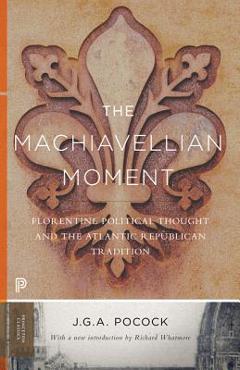The Machiavellian Moment: Florentine Political Thought and the Atlantic Republican Tradition - John Greville Agard Pocock

Detalii The Machiavellian Moment: Florentine Political
libris.ro
242.76 Lei
269.73 Lei
Political Science
John Greville Agard Pocock
The Machiavellian Moment: Florentine Political - Disponibil la libris.ro
Pe YEO găsești The Machiavellian Moment: Florentine Political de la John Greville Agard Pocock, în categoria Political Science.
Indiferent de nevoile tale, The Machiavellian Moment: Florentine Political Thought and the Atlantic Republican Tradition - John Greville Agard Pocock din categoria Political Science îți poate aduce un echilibru perfect între calitate și preț, cu avantaje practice și moderne.
Preț: 242.76 Lei
Caracteristicile produsului The Machiavellian Moment: Florentine Political
- Brand: John Greville Agard Pocock
- Categoria: Political Science
- Magazin: libris.ro
- Ultima actualizare: 28-10-2025 01:22:05
Comandă The Machiavellian Moment: Florentine Political Online, Simplu și Rapid
Prin intermediul platformei YEO, poți comanda The Machiavellian Moment: Florentine Political de la libris.ro rapid și în siguranță. Bucură-te de o experiență de cumpărături online optimizată și descoperă cele mai bune oferte actualizate constant.
Descriere magazin:
Originally published in 1975, The Machiavellian Moment remains a landmark of historical and political thought. Celebrated historian J.G.A. Pocock looks at the consequences for modern historical and social consciousness arising from the ideal of the classical republic revived by Machiavelli and other thinkers of Renaissance Italy. Pocock shows that Machiavelli\'s prime emphasis was on the moment in which the republic confronts the problem of its own instability in time, which Pocock calls the Machiavellian moment. After examining this problem in the works of Machiavelli, Guicciardini, and Giannotti, Pocock turns to the revival of republican ideology in Puritan England and in Revolutionary and Federalist America. He argues that the American Revolution can be considered the last great act of civic humanism of the Renaissance and he relates the origins of modern historicism to the clash between civic, Christian, and commercial values in eighteenth-century thought. This Princeton Classics edition of The Machiavellian Moment features a new introduction by Richard Whatmore.

Produse asemănătoare

The Machiavellian Moment: Florentine Political Thought and the Atlantic Republican Tradition - John Greville Agard Pocock
![]() libris.ro
libris.ro
Actualizat in 28/10/2025
242.76 Lei
Produse marca John Greville Agard Pocock

The Machiavellian Moment: Florentine Political Thought and the Atlantic Republican Tradition - John Greville Agard Pocock
![]() libris.ro
libris.ro
Actualizat in 28/10/2025
242.76 Lei